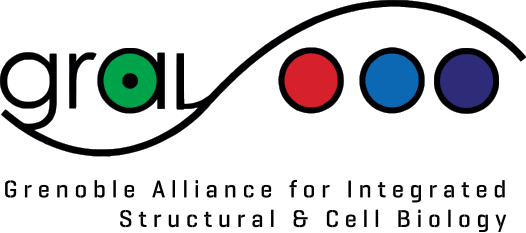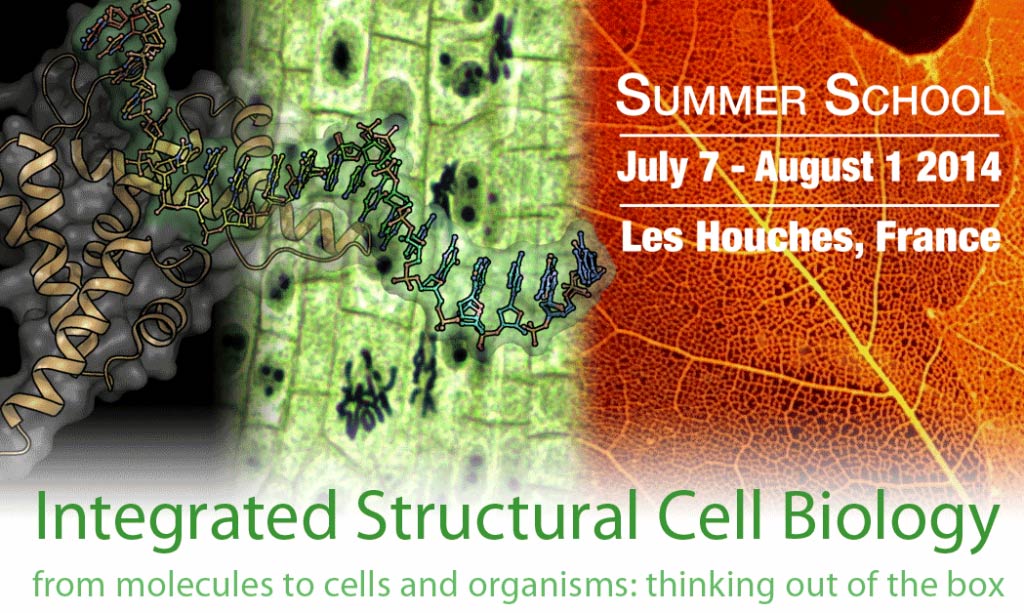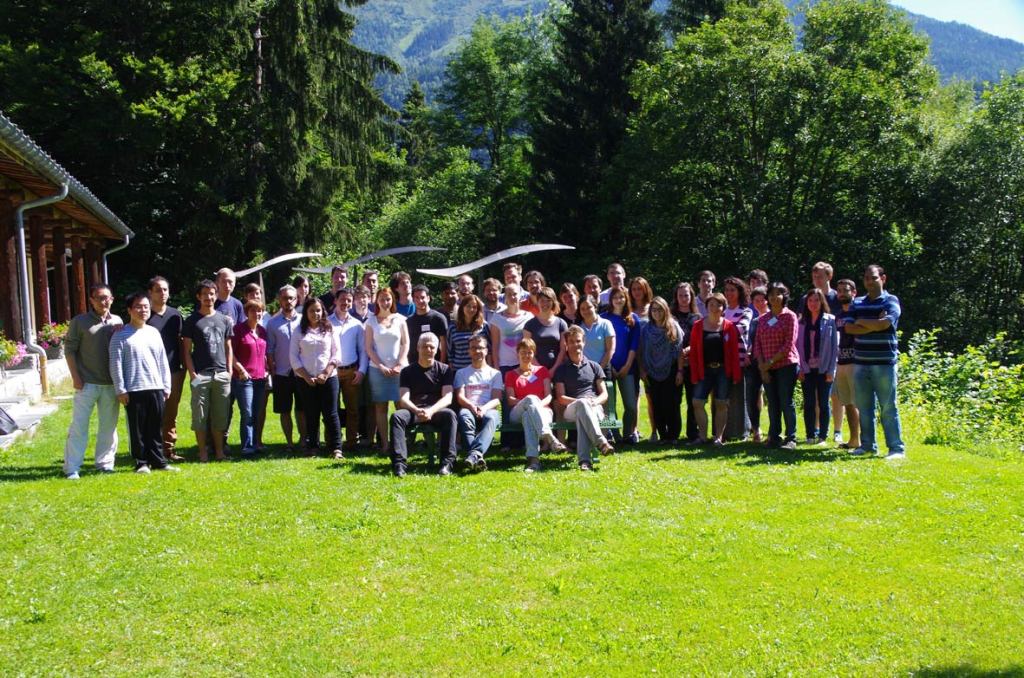Summer school Les Houches 2014
Les Houches Summer school, 7th July to 1st August 2014
43 participants attended the 4-weeks summer school, which took place in July at Les Houches in the Chamonix valley. The school aimed at preparing students and young researchers to new coming strategies also based on concepts in physics that open new ways of thinking biology. The participants, 35 doctoral students and 8 post-docs, came from 14 different countries, mainly European but also from China, India, United States and Canada, with 21 different citizenships. Roughly half of the participants have been initially trained in biology, and half in physics, and a few in chemistry. Based on 3 main biological topics, plant growth and flower development, interaction between viruses and host cells, membranes and transporters, the lectures illustrated various integrative approaches, and showed how concepts in physics and mathematics contribute to the understanding of biological processes from the molecular level to cells and organisms. In addition to the lectures and to a few practicals, the participants spontaneously organized late evening sessions on topics they had chosen themselves. Despite the bad weather, a few hiking and climbing sessions were also possible, and contributed to the extremely good ambiance and the interactivity of the students during the lectures. A 4-weeks school is a unique opportunity for an interdisciplinary teaching, and allowed additional explanations during lunch or afternoon breaks, not only from the lecturers but also in between the participants from biologists to physicists and vice-versa. A book will be edited by Oxford University Press, and should be a helpful guide in teaching at the interface between biology and physics.
A few comments from the participants:
- The topics treated during this month were broad enough to enlarge our scientific knowledge
- I appreciated very much the emphasis on the methodological aspects of the topics treated. One of the most important things that I learned is that in the study of biology it seems that the most crucial limiting factor is the power of the experimental techniques. Therefore I liked a lot the fact that so much was explained about the different experimental methods.
- The pure theoretical courses on membrane biophysics and plant modeling were especially interesting
- I liked the fact that each speaker did short introduction about general concept, like this everyone of the audience can be able to understand the lecture
- The school was a fantastic experience for me, from every point of view. I learned a lot about biology in general, and I have a much clearer idea of what the future of my research could be. Also, I find that it is very important to bring together physicists and biologists, because of the difficulty of talking to each other, and the importance of building a common language for the progress of science in our field. The school was a wonderful moment to do this.
- The variety of subject brought me a lot on the long term and it was a really good occasion to discuss with people far away from my field and to discover other ways of doing research
- It was a great experience. I hope it will be repeated in the future for other students.
- The long-format summer school was a great way to get immersed in these complex, inter-disciplinary ideas. I was better able to appreciate the nuances of other people’s work than during a short conference.
Organizers
Eva Pebay-Peyroula, Hugues Nury, François Parcy, Rob Ruigrok, Yves Gaudin, Christine Ziegler
Funding
The total budget of the school was 98 k€. The school received funds from the CNRS, the German-French University, Instruct, FRISBI, GRAL and INRA. The total fees for participants were 1500 € for the 4 weeks. Thanks to the external funding, grants ranging from 300 to 1500 € could be allocated to 34 participants (the other didn’t request financial support).
A few statistics on participants
Working place
Europe: 3 Germany – 1 Denmark – 2 Spain – 21 France –2 UK – 1 Italy – 2 Netherlands – 1 Slovenia – 2 Sweden
Others: 1 Canada – 2 China –3 India – 1 Israel –1 USA
Citizenships
Europe: 1 Bulgaria –2 Germany – 1 Denmark – 3 Spain –12 France – 4 Italy – 1 Liechtenstein – 2 Netherlands – 1 Poland – 1 Portugal – 1 Russia – 1 Slovenia – 1 Ukraine
Others: 1 Canada – 2 China – 1 Colombia –1 Egypt – 4 India – 1 Israel – 1 Lebanon – 1 Mexico
Speakers and Lectures
- Patricia Bassereau (Inst Curie, Paris) Forces in Biology
- Franz Bruckert (INP, Grenoble) Basics in Cell Biology
- George Coupland (MPI, Cologne) Mechanisms controlling time measurement in plants and their significance in natural populations
- François Dehez (SRSMS CNRS-Univ. Nancy, Nancy) Molecular simulations : a virtual microscope in the toolbox of integrated structural biology
- Yves Gaudin (LVMS CNRS, Gif-sur-Yvette) Protein conformational changes, Conformational changes in viral fusion proteins, From conformational diseases to cell memory
- Christophe Godin (INRIA, Montpellier) Virtual Plants
- Olivier Hamant (ENS-Lyon) Forces in plant development
- Mischa Kozlov (Tel-Aviv) Physical models of membrane shaping and remodeling by proteins
- Hans-Georg Kraüsslich (Heidelberg) Host-Pathogen interactions
- Enrico Luchinat (Florence) NMR spectroscopy, from basic concepts to advanced methods
- François Parcy (LPCV CNRS-CEA-UJF, Grenoble) Floral development: an integrated view
- Catherine Royer (Rensslaer Polytech Inst, USA) Single molecule methods
- Gebhard Schertler (PSI, Villingen) Micro and nano-crystallography
- Dirk-Jan Slotboom (Univ. Groningen) SEC-MALLS to determine protein oligomeric states
- Winfried Weissenhorn (UVHCI UJF-EMBL-CNRS, Grenoble) Virus assembly and budding
- Jo Zaccai (ILL, Grenoble) Thermodynamics (a reminder)
- Christine Ziegler (Univ. Regensburg) Structure determination by crystallography and electron microscopy
Practicals
- Hugues Nury (IBS CEA-CNRS-UJF, Grenoble) Molecular representations, How to use Pymol
- Hassan Belrhali (EMBL-Grenoble) How to solve a protein structure by crystallography
- Leandro Estrozi (IBS CEA-CNRS-UJF, Grenoble) Exploiting electron microscopy data
- Anja Kieboom (Grenoble) Observing and drawing plants
- Serge Aubert (Univ. Grenoble) Observing plants and their adaptation to harsh conditions
Public Conference
- Serge Aubert (Univ. Grenoble et Jardin Alpin Lautaret) Les plantes alpines et leurs adaptations à la vie en milieu extrême
- It is traditional at Les Houches Summer schools, to invite a speaker for a public conference given in French in the village of Les Houches.


